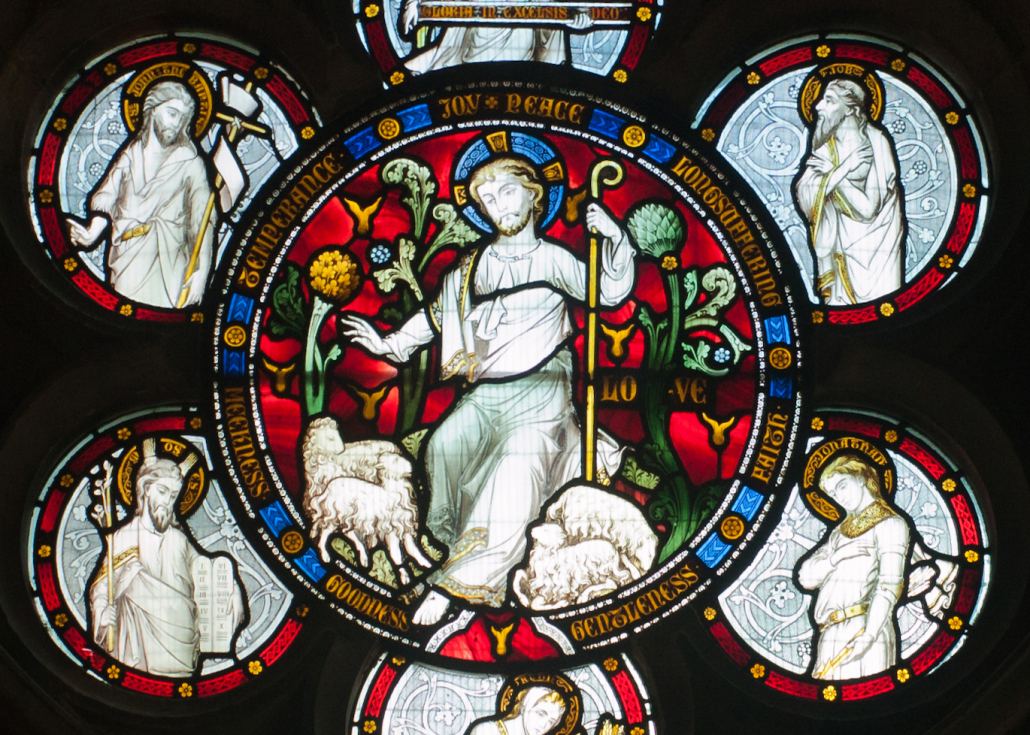Image (detail): Stained glass window at Christ Church Cathedral in Dublin, depicting the Fruits of the Holy Spirit along with role models representing them, i.e. the Good Shepherd representing love, an angel holding a scroll of Gloria in excelsis Deo representing joy and Jesus Christ, Job representing longsuffering, Jonathan faith, Ruth gentleness and goodness, Moses meekness, and John the Baptist temperance. Executed by Hardman & Co. in the 1870s.
‘Hold on, hold on’
Andrew Collis
Ordinary Sunday 13, Year C
Galatians 5:13,22-25; Luke 9:51-62
Jesus says, “Whoever puts a hand to the plough but keeps looking back is unfit for the reign of God.”
“Well, I got my hand on the gospel plough / And I ain’t got nothin’ for my journey now // Keep your hand on that plough, hold on / Hold on, hold on / Keep your hand on that plough, hold on …”
The African-American spiritual is based on our gospel for today.
“Hold on, hold on …” I love this … we hold on because there is work to do (preparing the ground, planting) … and we hold on because the work is thrilling … exciting/life-affirming/joyful/Spirit-filled work …
We hold on (to goodness, to goodness in the world and in each other) because, as Korean-German philosopher Byung-Chul Han says, “without hold there is no freedom”.
“Oh, Mary wore three links of chain / Every link was Jesus’ name // Keep your hand on that plough, hold on / Hold on, hold on / Keep your hand on that plough, hold on …”
Without hold – relationship, commitment, connection, links of chain/tradition – there is no freedom.
Keep your hand on that plough … hold on …
American poet Fanny Howe writes: “This is why I keep moving and only stop for the Eucharist in a church where there are sick … screaming … useless, happy, pious … hypocritical … rich, poverty-stricken people …”
Keep your hand on that plough … keep it real … means being faithful to our responsibilities, using our time well (that fruit of the Spirit might multiply and sustain).
In the 1960s the lyric became “Keep your eyes on the prize”, an anthem for the labour and civil rights movements. Sung at rallies and demonstrations, the words of endurance, of staying the course, gave strength to those entangled in what seemed an impossible fight for freedom.
The struggle is one we are not always well suited to face.
Ethicist Sharon Welch writes: “The despair of the affluent, the middle class, has a particular tone: it is a despair cushioned by privilege and grounded in privilege. It is easier to give up on long-term social change when one is comfortable in the present – when it is possible to have challenging work, excellent health care and housing, and access to the fine arts. When the good life is present or within reach, it is tempting to despair of its ever being in reach for others and resort to merely enjoying it for oneself and one’s family …
“Becoming so easily discouraged is the privilege of those accustomed to too much power, accustomed to having needs met without negotiation and work, accustomed to having a political and economic system that responds to their needs …”
Keep your hand on that plough … don’t look back …
Guatemalan poet Julia Esquivel offers this closing prayer that seems aptly suited for our journey:
“Jesus said, ‘You ought always to pray and not to faint.’ So we do not pray for easy lives; we pray to be stronger [people of faith]. And we do not pray for tasks equal to our powers, but for power equal to our tasks. Then, the doing of our work will be no miracle – we will be the miracle. Every day may we wonder at ourselves and the richness of life which has come to us by the grace of God.” Amen.




